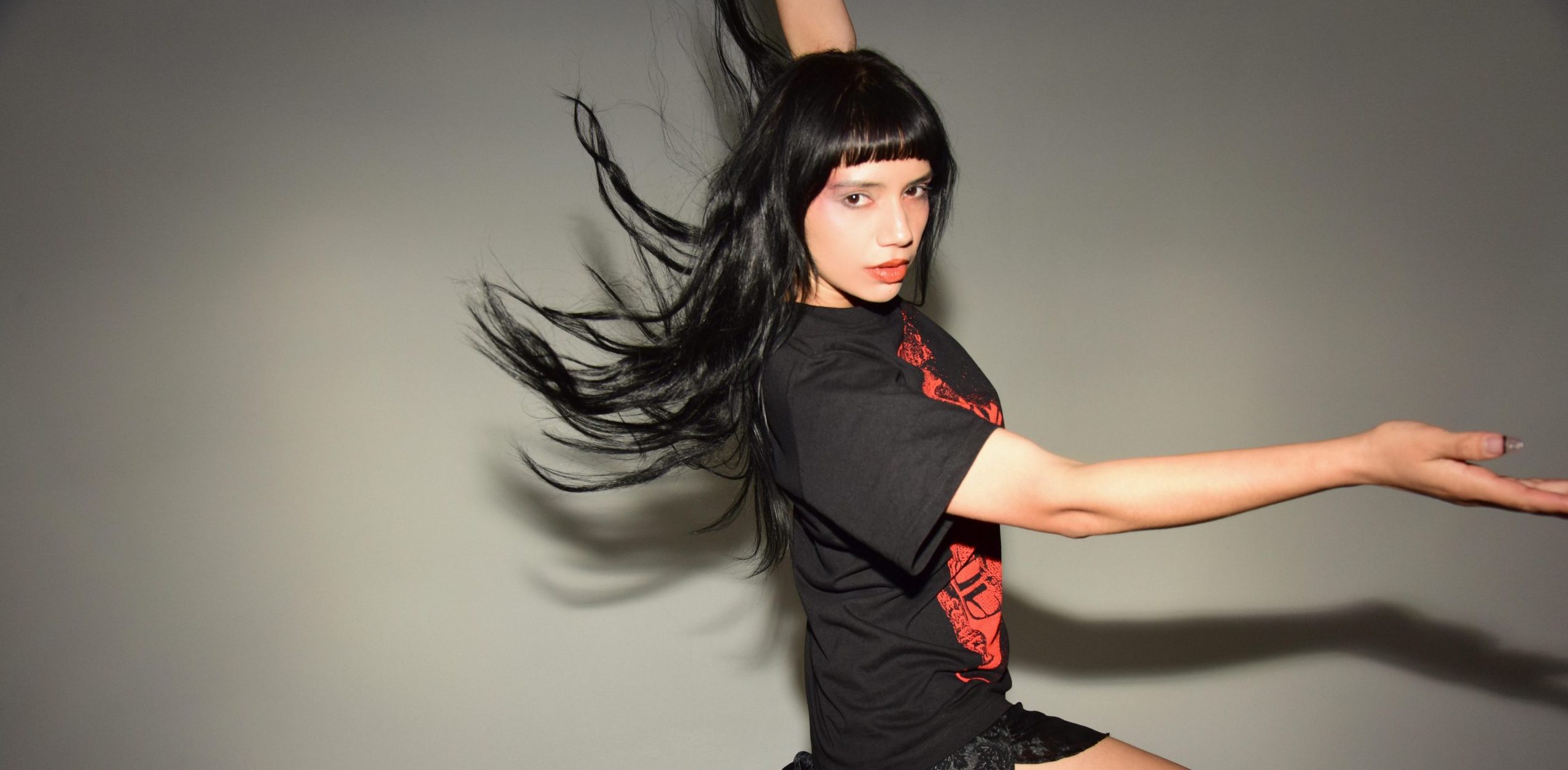Gone is Angélica Garcia’s classic blue eyeshadow; vanished are the vivid purples and oranges of her 2020 album, Cha Cha Palace. Instead, in her new music videos and across her Instagram, she can be seen rocking a sharp black cat-eye just beneath her straight black bangs, a signal of her transition to her upcoming album, Gemelo. Aside from this aesthetic shift, the new record features plenty of contrasts from her 2020 project. One of the biggest changes? The entire record is in Spanish.
Though she dedicated Cha Cha Palace to her grandmother, who had a significant hand in raising her in Northern California, she realised upon release that language barriers prevented her from truly connecting with it.
“Everyone I cared about, and also the whole culture, there was a whole side I wasn’t connecting to because of the language I wrote this record in,” she admits. “My grandmother is the reason I speak any Spanish, because she really instilled it in me.”
With this in mind, her vision for Gemelo began to take shape. But while to native English speakers her Spanish may sound effortlessly fluent, Angélica confesses that it was challenging for her to produce this work.
“My Spanish is not perfect, it’s far from it. It was a real labour to sit there with this body of work and articulate myself in Spanish. It was such a process with different translators. I was sitting there comparing [the lyrics] with people from different countries, different regions…”
She described the constant push-and-pull of dialects that she experienced in making this record, saying, “This person says I’m very incorrect, this person says ‘okay it doesn’t totally make sense, but it does in a poetic way, so it kind of works.’ It was so much more of a trial and error process just to communicate.”

Throughout the writing process, Angélica also began to process familial emotions that had been buried deep for generations, starting the work of breaking negative cycles.
“I focused on this subject of grief because I felt there were things that I was going through that were super heavy, but they somehow felt connected to other people in my family across generations,” she tells me. “It felt like a generational unblocking. Maybe I’m the first generation to have these tools like therapy and conversations about gender. I really wanted to unblock these things not only for myself, but also so it didn’t continue for my family.”
Her song ‘El Que,’ released as a twin single to ‘Y Grite,’ displays these themes both lyrically and sonically, as she chants short, firey lyrics: ‘El que conduce, persigue/Use, y grite/Inventa/Lamenta/Repitite/CONFUNDE/Lloraba, deliraba/Antes pasaba/Ya veo peligro/Es el que confunde…’ which roughly translates to ‘He that conducts, pursues/Uses and yells/Invents/Laments/Repeats/CONFUSES/I cried, I hallucinated/That happened before/I already see danger/Is one that confuses.’ Her chants are backed by strong percussion and powerful crowd shouts, building up the feelings of anticipation and darkness. It’s a forceful energy that easily encapsulates the listener into the world of this album.
While Angélica worked tirelessly to construct this world, there were also moments that felt like they were destined to be. One of these moments was in the making of the track ‘Juanita.’
“I was talking about it being ancestral. I was sitting in my room and I had just started this process of collecting the names of family members, like past ancestors, because I was just on this quest to find out where I’m from. If you’re going to break these patterns you have to find out where they originate. I was doing that and this song just kind of dropped out of the sky. Two weeks later I find out, when speaking with my mother, ‘Oh, your great-grandmother Mama Juana, like Juanita.’ I didn’t get to her yet, so I didn’t realize that I had a great-grandmother named Juanita,” still echoing her disbelief about this discovery.
While the lyrical world of this album is complex, the production behind it is just as interesting and dynamic, a lot of which comes from Carlos Arévalo, the guitarist of Chicano Batman. They connected after he saw her in an article on Guitar Magazine during the pandemic, and from then on it was creation.
“Obviously [Gemelo] has some of those classic Chicano Batman synthesiser vibes because he has all those awesome synths,” she says of Arévalo’s influence. “I pulled for him a bunch of records. I was super inspired by Solange at the time, like When I Get Home.
“There was also a Madonna record from like 2000 that I loved when I was a kid and I was like… this. Space Cowgirl Madonna is it for me,” she laughs, referencing the video for ‘Don’t Tell Me.’
She also mentioned some of her Spanish influences, bringing up Mexican popstar Fey. “She had a really cool dancey electronic record, Tierna de la Noche, where she was sleeping in the centre of the sun.
“I was thinking of all the textures within those records. I knew that, because of what I was talking about, it couldn’t be one thousand percent dancey, at least the way I was telling it. But, I was really into this electronic, kind of cosmic-y world for it.” Thus, this record of dark synths, gorgeous and haunting vocal moments, and fierce emotions was born.
To close out our chat we touched on the future of this record, discussing how her next single, ‘Color De Dolor,’ fits into the world of Gemelo. In it, she says “the chorus is asking ‘What is the color of pain?’ We can’t always separate ourselves from the things that we grieve, whether it’s somebody passing or something traumatic that happened to us. Those things leave a stamp on our lives” she acknowledges.
“We can’t always separate ourselves from that grief, but what we can do is paint it in color. Rather than fixate on the trauma and sadness itself, I can instead choose to focus on what that taught me, people I met through that grief, people that came to help me. I can focus on the beautiful things that came through that experience,” she says with a smile that looks like a breath of relief. She mentioned that, while creating this album, she had stuck a paper on her wall on which she had written “One True Self” in order to remember that it was okay to be all things at once. This album seems to be doing just that.
Ultimately, as she awaits the release, she can’t wait to see who gravitates towards this record. “I’m actually super excited to see who connects with this,” Angélica beams. “Those people that come up to me, those are truly my people. If you speak the language, if you feel the music in this way, that’s amazing.”
You can pre-save and preorder Gemelo here. It is out for release on 7th June, 2024.


